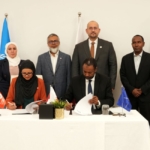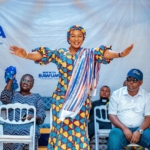
Dear Ministry of Gender, Children and Social Protection,
This letter is written with both hope and urgency; hope for what Ghana can become for its girls, and urgency because too many of our daughters are being silenced, broken, and forced into womanhood long before they are ready.
Across the country, the Ghanaian girl child is taught to be obedient before she is taught to be confident; to be silent before she is encouraged to speak; to endure pain before she is permitted to dream. And while policies exist to protect her, the reality in many communities tells a different story — one where girls are fighting battles they never chose and should never have to fight.
If we listen closely, the truth is not hidden.
It echoes in the tears of a 13-year-old girl who was raped on camera by 49-year-old Samuel Armah.
It trembles in the voice of teenage girls studying in learning environments where male teachers are boldly demanding “Self-control Allowance” and incentives for not harassing the girls they are supposed to be teaching and mentoring.
It whispers in the silence of countless girls in institutions of learning who never report abuse because society will shame and punish them for speaking up instead of protecting them.
These girls are not statistics — they are children with hearts full of dreams that are being crushed by violence, patriarchy, and neglect. They are Ghana’s future, yet far too often they are treated as afterthoughts who are expendable.
A Call to Strengthen Ghana’s Response to Gender–Based Violence
Ghana has long presented itself as a nation that values equity, children’s rights, and the empowerment of women. Yet, despite progress made, the lived experiences of many girls and women in our communities reveal a persistent gap between policy and reality. Gender–Based Violence (GBV), harmful cultural practices, and systemic neglect continue to undermine the dignity, safety, and potential of the Ghanaian girl child.
As we move toward consolidating Ghana’s democratic and developmental gains, prioritising the welfare and protection of girls is not only morally necessary but crucial to national progress.
The Current Landscape: Progress Yet Persistent Gaps
Over the years, Ghana has implemented several frameworks and interventions, such as the Domestic Violence Act (Act 732), the establishment of DOVVSU, and various social protection policies. These initiatives have contributed to awareness and some level of response capacity.
However, the following concerns continue to hinder meaningful change:
High prevalence of sexual and domestic violence against girls and women, with low reporting rates due to stigma and mistrust of institutions.
An under-resourced DOVVSU, which is unable to provide necessary shelter and safe spaces to escape gender based violence.
Child marriage remains prevalent across the country, robbing girls of education, health, and economic opportunities.
Cultural and religious narratives continue to normalise male dominance and female subservience, shaping harmful practices and limiting girls’ autonomy.
Underfunding and weak enforcement of existing gender and protection policies limit impact.
Limited psychosocial support systems, including expert trauma assessment and treatment, particularly in rural areas, leave survivors without sustained care or reintegration pathways.
To address these challenges effectively, Ghana must move beyond policy formulation into deliberate implementation, funding, community reform, and accountability.
We Need More Than Policies — We Need Action
We acknowledge the progress made. Laws have been passed, units have been set up, and campaigns have been launched. But the truth is: most girls still do not feel safe, supported, or protected. The Ministry must move from awareness to transformation; protection must be proactive, not reactive. Below is a suggested action plan for uptake.
- Increase Investment in Gender–Based Violence Prevention and Response
There is a clear gap between legislation and enforcement. Government must:
Allocate sustained funding for GBV shelters, hotlines, survivor rehabilitation, legal aid, and community outreach.
Expand DOVVSU training and resourcing across the country—especially rural districts where community norms silence victims.
- Strengthen Community-Based Prevention Through Education in collaboration with the NCCE and any other relevant stakeholders. Early transformation is the most sustainable form of change. The Ministry should:
Integrate comprehensive gender equality education, consent literacy, bodily autonomy and sexual and reproductive health rights into school curricula from primary to secondary levels.
Partner with community leaders, faith institutions, and local influencers to dismantle harmful norms through culturally sensitive dialogue.
Work hand-in-hand with communities, parents, and faith leaders to rewrite harmful narratives that normalise the suffering of women and girls.
- Engage Men and Boys as Allies
Gender empowerment cannot be successful if men and boys are overlooked. The Ministry should invest in:
Targeted programs that teach boys empathy, emotional intelligence, consent, and respect for girls’ autonomy.
Male-led community advocacy groups to challenge patriarchal norms and promote accountability.
- Provide Sustainable Empowerment for Girls
True protection goes hand-in-hand with empowerment. Ghana must focus on:
Expanding mentorship, STEM access, scholarship programs, vocational training, and leadership opportunities for girls.
Bolstering support for teenage mothers to continue their education without stigma.
Holding any adults responsible for impregnating teens in violation of age of consent standards accountable for their crimes. - Invest in Data, Accountability, and Monitoring
Reliable data is critical for coordinated action. Ghana needs: Better data collection on domestic and sexual violence cases, outcomes of prosecutions, and survivor support access.
Periodic national reports on the state of the Ghanaian girl child to ensure accountability and policy improvement.
Why This Matters to Ghana’s Future
A nation thrives when its women and girls thrive. Investing in the girl child reduces poverty, increases literacy, builds healthier families, and strengthens democratic participation. Ghana cannot expect to achieve SDG 5 or its national development aspirations if half of its population remains marginalised, violated, or silenced.
Every girl deserves to dream, to learn, to speak, to be safe, and to live with dignity. This is not a women’s issue—it is a national development issue. It is a national wound that bleeds into our homes, schools, communities, and future. When a girl is abused, silenced, or denied the chance to thrive, Ghana loses a leader, a creator, an innovator, a change-maker.
But the bravery of survivors tells us one thing: our girls are not weak — our systems are. A nation that fails to protect its girls fails itself.
A Call to Bold, Coordinated Action
The Ministry of Gender, Children and Social Protection holds a mandate that is both noble and urgent. It is time to move from commitment to transformation—from reactive interventions to preventive, structural, and community-driven change.
Ghana stands at a defining moment. Strengthening support for the girl child and eradicating gender–based violence is not only possible—it is necessary for the country we envision.
We call on the Ministry to lead decisively, collaborate widely, and act boldly. The future of Ghana’s girls—and the nation itself—depends on it. Invest in safe spaces, shelters, trained counsellors and survivor support centres in every region!
The Ghanaian Girl Deserves Joy — Not Endurance
For too long, we have praised girls for their strength in suffering. But a girl’s value is not in how much pain she can endure. Her value is in her imagination, her brilliance, her voice, her magic — and it is time we protect that magic fiercely.
Let us raise girls who are allowed to be children.
Girls who laugh loudly and dream boldly.
Girls who are safe in their bodies, homes, schools, streets, and futures.
Our Message to the Ministry Is Simple:
Protecting girls should not be an act of charity; it must be an act of justice.
The Ministry of Gender, Children and Social Protection carries a sacred responsibility. Ghana’s daughters are watching. The continent is watching. History will remember whether we rose to fight for the girl child, or whether we failed her.
It is time for bold action. It is time to centre the girl child, not as a slogan, but as a priority woven into every policy, every budget, every institution, and every community.
Ghana cannot prosper if its girls are unprotected.
A nation cannot rise when half its population is forced to kneel.
Let Us Build a Ghana Where Every Girl Can Rise; Whole, Safe, and Free.
With urgency, with hope, and with unwavering belief in what is possible,
This letter is written for every girl who is waiting to be seen, heard, and protected.
–
Author Bio: Dr Efe Plange is an Assistant Professor of Rhetoric and Writing whose scholarship examines feminist rhetorics, African digital cultural rhetorics, and feminist media literacy, with a particular focus on how African and Black women use digital platforms to resist patriarchal narratives and build counterpublics. She is the founder and director of the Plange Media Lab, a gender and culturally-responsive communications and media strategy initiative that supports institutions, creators, and brands in advancing inclusive, socially conscious messaging.
Beyond academia, Dr Plange is also a gender advocate—of the pepper variety—unapologetically committed to shifting conversations, disrupting patriarchy, and advocating for safer, more equitable worlds for women and girls.
- President Commissions 36.5 Million Dollars Hospital In The Tain District
- You Will Not Go Free For Killing An Hard Working MP – Akufo-Addo To MP’s Killer
- I Will Lead You To Victory – Ato Forson Assures NDC Supporters
Visit Our Social Media for More




